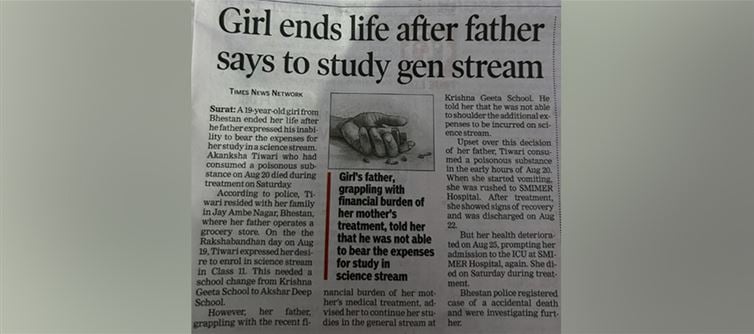
A young Brahmin girl ended her life because her family couldn’t afford her education. Meanwhile, the government allocates lakhs of crores for SC/ST/OBC welfare, leaving economically weak General Category families without support. In 2025, money decides who lives and who dies, and policy favors caste over genuine need. This isn’t just tragic—it’s a moral failure of democracy.
1️⃣ The Numbers Tell a Cruel Story
Over 3 lakh crores are allocated for SC/ST/OBC education schemes.
Scholarships, grants, and subsidies for the General Category? Almost non-existent.
Result: families who are poor but outside reserved categories are forced into hopelessness.
2️⃣ Tragic Consequences of Policy Gaps
Dreams die because education is unaffordable.
Talented, hardworking children from General Category families lose their future.
Mental health crises, suicides, and despair are ignored statistics in government reports.
3️⃣ Affirmative Action Isn’t the Problem—Neglect Is
Reservations exist to uplift historically oppressed communities.
But economic hardship doesn’t discriminate by caste.
Equity means helping every child in need, not leaving anyone behind.
4️⃣ Democracy vs. Morality
Voting is the only operational element of a functional democracy in India.
Ethics, dignity, and support systems often serve as cover-ups to retain power.
If a child dies quietly, as long as the party wins votes elsewhere, nothing happens.
5️⃣ Invisible Struggles of the General Category
Poor General Category families are trapped in a policy blind spot.
No scholarships, minimal aid, and no safety nets.
They are economically deprived but socially invisible, a tragic irony in a system obsessed with caste-based statistics.
6️⃣ Brutal Reality Check
Life or death is determined by policy priorities, not merit or need.
government funds are massive—but distribution ignores equal suffering.
A poor child dies, a politician remains in power, and the system celebrates numbers over humanity.
7️⃣ What Real Equity Should Look Like
Scholarships and financial support for all economically needy children, regardless of caste.
Mental health and counselling programs for struggling families.
Transparent monitoring to ensure no child loses education due to money.
Policy driven by humanity, not vote banks.
Conclusion: A Democracy That Counts Crores, Not Lives
The death of a poor Brahmin girl exposes the deep, deadly flaw in India’s social policies. Affirmative action is necessary—but it cannot become a tool that leaves other needy children to die. education must never depend on caste or money; every child deserves a future.




 click and follow Indiaherald WhatsApp channel
click and follow Indiaherald WhatsApp channel